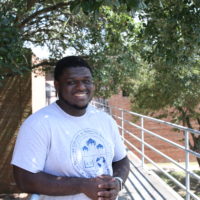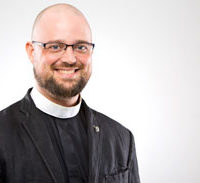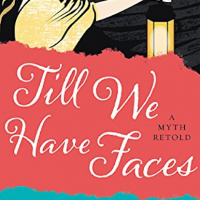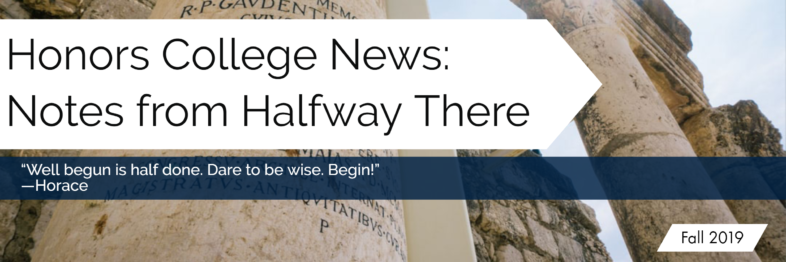
Honors College: News & Notes: Fall 2019
How do you make changes that last forever? One way, it seems to me, is to bring about change in students, those everlasting creatures who appear and reappear on campus each fall semester. If anything that teachers do has a hope for making a difference, it’s likely to be grounded in a genuine friendship between teacher and student. In the Honors College, we call this “mentoring,” but whatever you like to call it, the reality is the same: teachers and students meeting together, discussing books, ideas, experiences, emotions, and all the other stuff of real life.
This edition of Notes from Halfway There features four great things related to mentoring: first, Rev. Dr. Micah Snell, who is a faithful mentor to the students entrusted to him; secondly, a current Honors Scholar, Daylon Piper, who describes the ways he’s growing in the Honors College; thirdly, an Honors College alumna, Paige Holden, who describes the ways she’s been changed for the better by her mentors and how she hopes to serve now as a mentor to others; and, lastly, C. S. Lewis’s enigmatic retelling of an old tale, Till We Have Faces, which features the relationship between a regal student, Orual, and her patient mentor, the Fox. As we make our way forward, mentoring and being mentored by others, let us not lose sight of the everlasting importance of genuine friendships.
Gary Hartenburg
Director, The Honors College
Houston Christian University
Featured in this issue of News and Notes:
Current Student: Daylon Piper
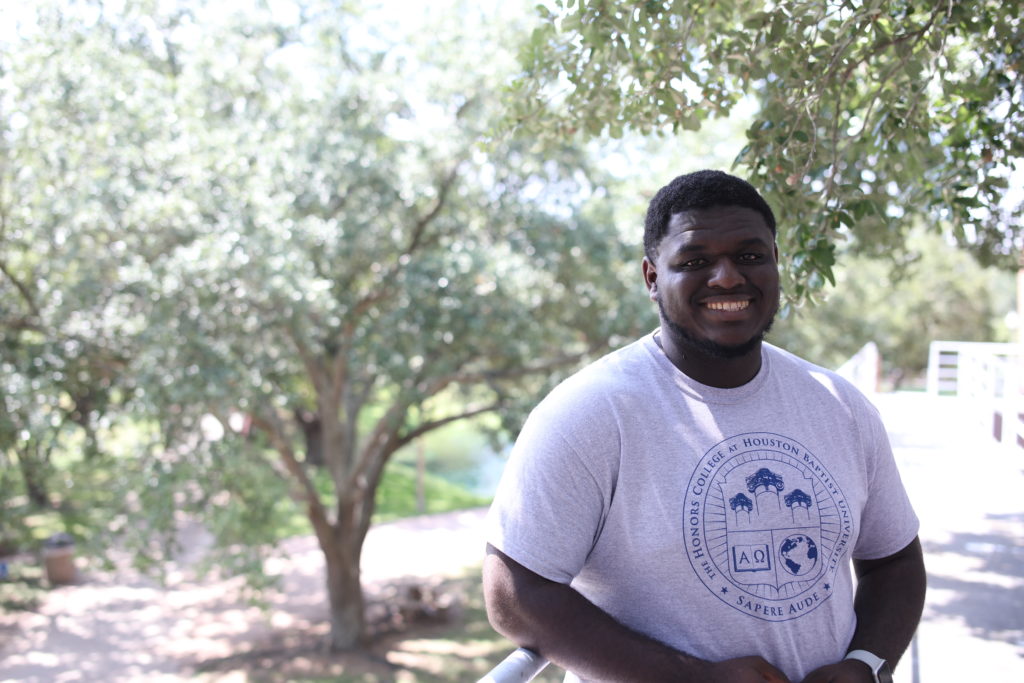
Daylon Piper is a junior at Houston Christian University. Alongside his Honors College courses, Daylon is pursuing a bachelor’s degree in Christianity and is on track to earn his masters in divinity as well, all within five years. Daylon is a member of Covenant Fellows, Ratio Christi, Pro-Life Huskies, and Baptist Student Ministries. An active student on campus, Daylon is known both inside and outside of the classroom for his kind smile, his thoughtful nature, and his desire to serve others.
What are your plans once you graduate from HCU?
I’m not sure what specific career I’d like to pursue after graduation, but I am planning on pursing a PhD in a Christian field.
How has the Honors College benefited your undergraduate experience as a whole?
The Honors College has broadened my view on many issues and has helped me sharpen my own views on philosophical issues and issues within the faith. It has also helped me meet many people with similar interests who share a love of learning.
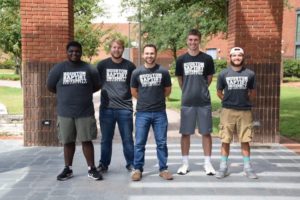
What is one aspect about the Honors College that you will always remember after graduation?
I will always remember our discussions.
What advice would you give to incoming Honors College students?
Although the workload my look daunting, it is do-able. Some assignments will be easier than others, and it becomes easier to pace everything out. Not every reading assignment will be 100+ pages, so its best to look ahead and plan in advance.
Have you noticed any changes in yourself during your time at HCU?
I’ve become a lot more confident in my knowledge during my time in the Honors College. I’ve learned how to judge information and opinions better, which has helped me become more secure in my beliefs. This has also bled into my personality, as I’ve become much more comfortable in my own skin.
What are you most excited for in the future?
I’m most excited to pursue a PhD. I’ll get the opportunity to learn many things and put my knowledge to use.
C. S. Lewis: Till We Have Faces
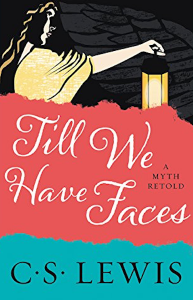 C.S. Lewis’s Till We Have Faces is a story of everyman. This might seem paradoxical. How is a myth-retold about an ancient pagan queen of an obscure country one with which we can all identify? Orual endures sufferings common to all: Jealousy of a favored sibling, anger at divine injustice, her father’s misunderstanding (even hatred), and perhaps most of all the hopelessness of her own insignificance. Orual is saved first by the wisdom of her Greek teacher and friend the Fox. Orual is saved ultimately when she comes face to face with the benevolent god she has hated her whole life.
C.S. Lewis’s Till We Have Faces is a story of everyman. This might seem paradoxical. How is a myth-retold about an ancient pagan queen of an obscure country one with which we can all identify? Orual endures sufferings common to all: Jealousy of a favored sibling, anger at divine injustice, her father’s misunderstanding (even hatred), and perhaps most of all the hopelessness of her own insignificance. Orual is saved first by the wisdom of her Greek teacher and friend the Fox. Orual is saved ultimately when she comes face to face with the benevolent god she has hated her whole life.
The novel is told in two parts, and in Part One it is not difficult to imagine that we see the purpose of Lewis’s cleverness. Orual rises through intelligence and daring to a long and prosperous reign of the Kingdom of Glome. Her first teacher the Fox imparts to her the wisdom of Greek philosophy. Her second teacher Bardia, the captain of the king’s guard, gives her martial prowess. The young woman seizes a moment of crisis, takes the place of her wicked father, and defeats the enemies of her kingdom. Elevating her teachers to counselors, Orual rules long with wisdom and strength.
Simultaneously, Orual endures outer and inner antagonists. The primary deity of Glome’s religion is Ungit (she the Greeks call Aphrodite). The novel’s first crisis comes before Orual is queen: When famine, plague, and war devastate Glome, the priest of Ungit demands the sacrifice of Orual’s beloved sister Psyche. The king acquiesces, setting in motion Orual’s hatred of the gods’ injustice. This hatred becomes Orual’s inward struggle. At the novel’s second crisis when Orual slays her enemy and becomes queen, she veils herself in the face of conflict. Making herself faceless she resolves to kill Orual and live only as the Queen. The first part of Till We Have Faces is then written as the Queen’s complaint against the gods after decades of rule. She expects the gods to punish her, but concludes that they have no answer.
Part Two changes everything. Without spoiling Lewis’s complex plot and themes, it turns out that Orual has misunderstood. Her complaint turns out to be its own answer. She, like everyman, has railed against fear and hatred and injustice. She, however, is granted a vision that highlights the extent of her own ignorance, sinfulness, and frailty. The title of the book comes from this moving passage:
Often when he was teaching me to write in Greek the Fox would say, “Child, to say the very thing you really mean, the whole of it, nothing more or less or other than what you really mean; that’s the whole art and joy of words.” A glib saying. When the time comes to you at which you will be forced at last to utter the speech which has lain at the centre of your soul for years, which you have, all that time, idiot-like, been saying over and over, you’ll not talk about joy of words. I saw well why the gods do not speak to us openly, nor let us answer. Till that word can be dug out of us, why should they hear the babble that we think we mean? How can they meet us face to face till we have faces?
In the Honors College we speak, rightly, about the joy and meaning of words. We can and should learn to artfully and joyfully say the thing we mean. Orual’s deeper meaning is that for each of us the thing we think we mean is less true than the dangerous words buried at the core of our being.
I offer two interpretive comments about this idea. First: We should not take it upon ourselves to dig this word out of ourselves or others. The core of being is precious and fragile, and not the place for any digging so clumsy as ours. Whether we are teachers or students, counselors or clergy, parents or children, ripping out the heart, even the heart of falsehood, is dangerously destructive.
The second point follows on the first: Orual is courageous and wise, but she lives in the world before the Incarnation. Her compaint, though enlightened, is a pagan complaint lacking the full revelation of the Son of God who came to dwell on earth and in our hearts. Though Orual may at the end glimpse the truth about God, Lewis points to the incompleteness of life without Christ. If Christ is planted in our hearts, growth will begin to push out the words of fear, anger, and ignorance that have previously lain at the center. The challenge during such growth is to let God work, and secondly to pray for those in such circumstance that they will allow God to work in their lives.This may be painful, but the alternative is to cling to that which should be dug out of us.
This season when we anticipate Christ’s Incarnation is an ideal time to prepare our hearts to welcome him. For though we see now only as in a mirror darkly, one day we will see Him face to face.
Fr. Dr. Micah Snell

Dr. Micah Snell is an Assistant Professor of English at Houston Christian University. While the majority of his courses are held within the Honors College, Dr. Snell also teaches courses at the graduate level as well as spear-heading a Freshmen Year Seminar course each fall.
Dr. Snell holds his PhD in Theology from the University of St. Andrews, St. Mary’s College, The Institute for Theology, Imagination and the Arts.
When did you realize you wanted to become a teacher?
I went to a public high school, and had a few really good teachers who first demonstrated what it might mean to aspire to a career in teaching. In college this transformed into a desire to teach college students, but I was back and forth between vocations in education and the church for several years before settling into my current position.
What inspired you to become an Anglican clergyman?
As I understand it, God placed a calling on my life and I had to answer it. After college when I started seriously wondering about this vocation, others started wondering the same thing about me. Through a period of gradual discernment I was given approval and support to go to seminary. It wasn’t until my last semester in seminary that it was clear what the next step would be in terms of pursuing work in the church, and even that only lasted a couple years before returning to my doctoral work. Now I’m an Anglican clergyman in a full-time academic role trying to dignify both callings. It’s a difficult challenge, but an important one I think, and the one to which I have been called. All of which is to say, in my case inspiration was an ongoing process of revelation and obedience that lasted for the last fifteen years. It is reassuring to look back and see God’s direction at every step of the way, even if it wasn’t always obvious at the time.
You are known for being a big fan of Shakespeare. What draws you to his work?
I do not think I am a big fan of Shakespeare. I think I have an objective appreciation for the work of the greatest literary mind to ever exist. Shakespeare is not the only contender for this title, but I think if we only read three great authors they would be Plato, Dante, and Shakespeare. Victor Hugo writes that “…Dante and Milton are, in a way, the twin buttresses of the edifice whose central pillar is Shakespeare: they are the counter-forts of the arch of which he is the keystone.” It is extremely rare for one imagination to transform our understanding of anything, and Shakespeare’s imagination transformed our understanding of every single thing he apprehended. Not only did Shakespeare single-handedly bring about the quantum revolution of theatrical performance, he also reinvented the ways we think about history, religion, politics, and what it means to be human. Shakespeare’s understanding of human nature profoundly influenced the thinking of such leaders as Abraham Lincoln (who thought Macbeth was the most insightful study of human nature during political tribulation) and Winston Churchill. The terror of Shakespeare’s tragedies is recognizing that we are all capable of such horror. The glory of his romances is believing that none of us is beyond redemption.
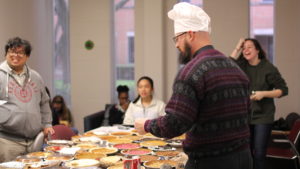
What words of encouragement do you have for Honors College freshmen as they begin their undergraduate journey?
(a) College is the last time in your life when you can presume to have the opportunity to let your intellectual curiosity run loose. Use it wisely to encounter new and good things. You’ll never look back and wish you had spent more time in college watching Netflix.
(b) American college culture tells you to “get involved.” This confuses being busy for doing good things, and way too many college students are over-committed to the point that they sacrifice the greater good of this once-in-a-lifetime opportunity for the sake of “the college experience.” Stress and burnout are the frequent and predictable results, and the disastrous consequences might follow you the rest of your life. It is good to foster deep friendships. It is often necessary to work. But studying is the pearl of great price for which you should now sell everything that you have, and to make the most of learning in college you need to have the luxury of leisure to pursue your studies with as little distraction as possible.
(c) REST! The effects of exhaustion on your physical, mental, and spiritual health cannot be offset by Red Bull, letting go and letting God, straight A’s, or being a social media influencer. You need seven to nine hours of sleep nightly and twenty-four hours off every seven days, because you inherited this little condition called “being human” and are not special or exempt from basic physiological needs.
(d) Everyone hits a crisis point in college. When that happens, admit to yourself that you need help, then admit it to those who can help you. Everyone here wants you to succeed and will help you do so.

Are there any stories you can share with us from your own time as a student?
I’m saving these for FYS or around the campfire.
What are you looking forward to the most this semester?
The things I will learn from my students.
Which fountain pen is your favorite?
Lamy Al-Star in burnt orange with a fine nib and Noodler’s Navajo Turquoise ink. But everyone’s first fountain pen should be a Lamy Vista or Pilot Metropolitan. I really thought this question was going to be about kayaks.
Is there anything else you would like to add?
Life is too uncertain these days to do anything but what really matters. None of us should waste time on anything that is not of eternal significance. The time for treasures on earth is never, but especially not now. Read and discuss the greatest things. Walk in love as Christ loved us, and gave himself for us. Put pride to death and be transformed in humility and brokenness. Success will be too difficult for any one of us, but we may do it together.
Honors College Alumna: Paige Holden

Paige Holden earned her bachelor of arts in Christianity from Houston Christian University in 2016. She completed the Honors College curriculum and graduated cum laud. She has since gone on to pursue a masters of divinity from George W. Truett Theological Seminary and is expected to graduate with honors in December of 2019.
Paige was recently hired as the Associate Youth Minister at Tallowood Baptist Church and has served in student ministry for the last six years at various other churches. She enjoys hiking, pottery, reading, traveling and fishing and desires to build a career writing spiritual formation curriculum for students and families.
What have you been up to since completing your undergraduate degree?
Immediately after graduating from HCU I began seminary in Waco, Texas. While in seminary I worked at Magnolia, as a bakery host, and served on staff at Harris Creek Baptist Church. While in seminary I have been able to take an array of classes, ranging from spirituality in the wilderness (where I spent a week at Christ in the Desert Monastery) to spirituality and education from a gardener’s perspective. During this time, I have been shaped spiritually and mentally by my community of peers and professors as I seek to see and know the world differently.
Where do you feel God is calling you in the near future?
It has been an incredible blessing to move back to Houston and serve on staff at a Church that knew and loved me during my time at HCU. As I am back in Houston, I hope that I am able to invest in young women who feel called to ministry through mentoring and discipleship. Along with investing in the next generation, I have a deep desire to continue with my education in pursuit of a doctorate of ministry. I anticipate that within the next four years I will be back in school.
How do you feel the Honors College benefited you as a student and as a person?
The Honors College challenged me to fall in love with learning in a way that I had never thought to do before. In high school I was a straight A student, not because I enjoyed school but because I valued good grades. During my time in college I learned how to read for the sake of learning, in order that I might be formed, shaped, and challenged by new information. That was an invaluable experience for me, and I am a better minister because of it. In order to teach my students well I must first know how to read, evaluate, and ask good questions, all things that the Honors College truly equipped me to do.
What are you most looking forward to in the future?
As I look to the future I am excited about the opportunities of teaching that lie ahead of me. From teaching my students weekly to special speaking opportunities, I am blessed and humbled by the possibilities that await me. My mother jokes that if I could, I would stay in school forever because I truly love learning and the energy of a classroom. What I have now found is that I learn even more by teaching. Through my preparation, presentation, and the questions of my peers my life is enriched with knowledge.
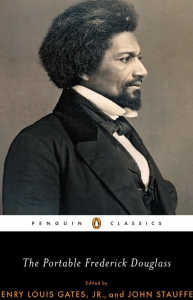 Is there a book that you feel has challenged your opinion on a topic or led you to a ‘light bulb’ moment?
Is there a book that you feel has challenged your opinion on a topic or led you to a ‘light bulb’ moment?
I was a Christianity major in college, and while I was drawn to and appreciate the great theologians that we were able to read, the book that challenged and transformed me the most was the Narrative of the Life of Frederick Douglass. He writes, “Once you learn to read, you will be forever free.” Douglass discusses the power and ability that knowledge has to set someone free. When people learn to read their lives are transformed by the power of knowledge. To read the Bible in all its fullness, to read the works of C. S. Lewis, to enjoy some of the greatest works such as the Iliad – there is a dignity and a freedom in these acts. Reading and learning are some of the greatest gifts we have been given, and I am forever seeking to do these things well.
What is the most challenging aspect of your life right now?
The Bible is a beautiful narrative that continues to deepen the way I understand God, Creation, myself, and my neighbor. My biggest challenge is teaching and discussing this narrative in a way that invites my students to a deeper, richer understanding of the world. The Orthodox Church has a very holistic understanding of the Christian life which the Western world often lacks. My desire is to see my students delight in this holistic Christian call, to be transformed by the Holy Spirit, and be challenged and changed by spiritual formation and service.
What has been the biggest blessing in this season?
My biggest blessing in this season has been having a community of women to share in the good and hard times in ministry. Truett Seminary has empowered me as a women minister through organizations such as Truett Women in Ministry, as well as giving me the opportunity to sit and learn under women scholars. The women who sat next me in the classroom, preached from the pulpit, who held babies with me in the nursery and journeyed with me through life have been beacons of grace, love, and kindness. I am blessed to continue in ministry knowing that women are being raised up to lead and love the church.
What advice would you give to incoming Honors College freshmen?
Get to know this community. Get to know your peers, the upperclassmen, and especially your professors. Get to know them outside of the classrooms; engage in life with them. While the conversations I had around the classroom about the Iliad and the Bible were good and memorable, the conversations we had around the dinner table were even better. When you commit to living your life to listening and learning with this community, you will be blessed far beyond what you can imagine. Some of my most transformative moments have been in Dr. Hartenburg’s office as I cried and contemplated what awaited me in the future. Take advantage of the wisdom and the insight that your peers and professors have to offer; you will cherish these moments forever.
Want More News & Notes?
Subscribe to the Honors College Newsletter to receive updates in your inbox!
Honors College Alumni can update their contact information by completing the Honors College Alumni Survey.
